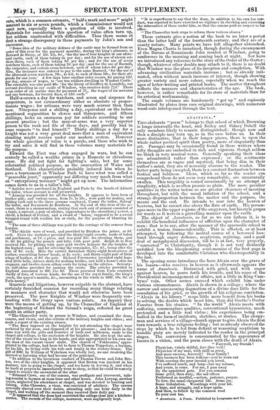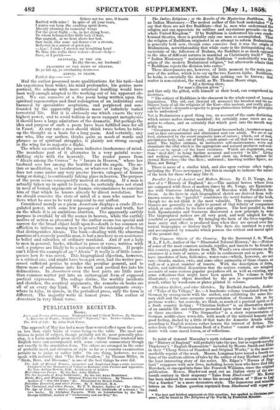ANASTASIA. • THIS elaborate "poem" belongs to that school of which
Browning is longo intervallo the head, and Bailey and Sidney Dobell the only members likely to remain distinguished ; though now and then a disciple may turn up, as in the case before us. In their more distinctive, that is their longer pieces, there is upon the whole rather poetical spirit than poetry, more of singularity than art. Passages may be occasionally found in these writers where lofty thoughts are embodied in rich and vigorous though seldom we think in very musical verse. Generally speaking their ideas are adumbrated rather than expressed ; or the sentiments themselves are so vague and mystical, that being dim in their author's mind, they are of necessity obscure to the reader. The better parts being excepted, there is a constant fluctuation between fustian and baldness. Ideas, which so far as the reader can comprehend them do not seem very remarkable, are unnaturally swollen. This turgidity is varied occasionally by an attempt at simplicity, which is as often prosaic as plain. The more peculiar qualities in the writer before us are greater clearness of meaning throughout, but with the usual inflation of the school, and a strange disproportion between the matter and the purpose, the means and the end. He intends to soar into the heaven of heavens, but he cannot rise above the flats of earth. His person- ages move in the upper regions of the empyrean, but his style gropes for words as it were in a grovelling manner upon the earth. The object of Anastasia, so far as we can fathom it, is to exhibit the beneficial influences of affliction upon the character of man: that is to say, after the manner of the spasmodic school to exhibit a truism transcendentally. This is effected, or at least attempted, by following the mental course of a bereaved hus- band through angry defiance, scepticism, repining, and a good deal of metaphysical discussion, till he is at last, very properly, " converted " to Christianity, though it is not very distinctly unfolded how the blaspheming semi-maniac of the first page is developed into the comfortable Christian who dies respectably in the last.
The opening scene introduces the hero Alexis over the grave of his Isaura—who receives in heaven as it afterwards appears the name of Anastasia. Distracted with grief, and with anger against heaven, he pours forth his trouble, and his sense of the Providential mismanagement of affairs, not a little in King Cam- byses' vein. Other scenes succeed which exhibit him under various circumstances. Alexis is shown in a college ; where the narrow and unreasoning dogmatism of a divine does little for the consolation of his grief, or the growth of his religious conviction. "Alexis in his library" reaps little more benefit from his books in solving the doubts which beset him, than did Goethe's Doctor Faustus from his studies. "In the world" Alexis meets with suffering, commonplace qualities, conventional hypocrisies, much pretended and a little real virtue ; his experiences being em- bodied in the form of incidents, sketches, or stories. The clergy- man and services of a village-church appear to give Alexis the hrst turn towards a true religious feeling ; but as already observed the steps by which he is led from defiant or reasoning scepticism to humble piety are merely indicated to the reader in the principal stages. The conversion is consummated by the appearance of Isaura in a vision, and the poem closes with the death of Alexis.
"Farewell, my friends !
Physician, vainly skilful, fare thee well! Physician of my soul, with skill as great And more success, farewell ! Dear family! This business has been tedious—you're worn out With nursing the poor invalid you loved. I've suffered much, and long—but my release, And yours, is come. For me, I pass away By the appointed gate. For you remains Some grief, then duty, the sad offices Performed as needful,—action, patience, prayer. To live, the usual chequered life. Some joy, Some tribulation. Wrestlings with your lot. A hope, and straggle, and a hope again. And then, to follow by the common road To your rest too.
• Anastasia. A Poem. Published by Longmans and Co.
Grieve not too sore, 0 hearts Knitted with mine ! In spite of all your tears, I scarce can keep the exulting spirit down, Already pluming its immortal wings For the great flight.—As, in her dying hour, To whom belonged this little lock of hair, Our anguish, as we bent above her bed, Saw itself, like some sad flower o'er a stream, Reflected in a mirror of ,great joy.
—Alas ! I sink—I stretch my trembling hand
To Him who walks these waters—Jesus—help- Save, or I perish-
AN.ViTASIA, IN THE AIR.
To thy throne, my husband !
FRAGMENT OF THE HYMN OP HEAVEN.
Be ye lift up, ye everlasting doors-
ALEXIS3 IN DEATH. Perfect day— —„
Had the author possessed more qualifications ,for his task—had his experience been wider, his mind profounder, his genius more poetical, the scheme with more artistical handling would have been well enough adapted to the working out of his apparent ob- ject. We can conceive of a fine poem being written upon the spiritual regeneration and final redemption of an individual soul harassed by speculative scepticism, and perplexed and con- founded by the apparently pathless maze of infinitely varied terrestrial life. But it is obviously one which exacts the very highest power, and to avoid tedium or mere rampant metaphysics it should have a large admixture of the dramatic. But perhaps the idea and purpose of such a poem have been fulfilled once for all in Faust. At any rate a man should think twice before he takes up the thought as a basis for a long poem. And certainly, any one who, like our author, thinks quite as much of words and phrases as of spiritual struggles, is plainly not strong enough in the wing for so majestic a flight.
The whole execution of the poem indicates incoherence of mind. The mundane part of it alternates in a very painful scene- shifting style with the heavenly. The reader passes from "Alexis among the Graves” to " Isaura in Heaven," where her husband sees her among the beatified and the angels. The ac- tion or meditation, or lucubration, or whatever it may be, (for it does not come under any very precise known category of human being or doing,) is continually taking place in heaven. The purpose of the poem seems consequently marred at starting. If a man is actually taken up in spirit to heaven, he certainly does not stand in need of human arguments or human circumstances to convince him of that which he knows already by direct revelation. But we should conceive the state of mind of a man who cannot be- lieve what he sees to be very congenial to our author. Considered merely as a poem Anastasia displays a crude ill-re- gulated power, with some few passages of nature and truth, but on the whole it is an ambitious abortion. The apparently earthly purpose is overlaid by all the scenes in heaven, while the earthly motive of action as presented by the author seems too special and narrow for the broad object built upon it—death is too common an affliction to induce among men in general the intensity of feeling that distinguishes Alexis. The book—dealing with the abnormal passions of a scarcely possible man, is but a mockery as an assistance to belief and salvation of ordinary mankind. And if not a help to men in general, books, whether in prose or verse, written with such a purpose are likely to be a nuisance or hindrance. If people can't follow the example of an " Alexis " it really is of little conse- quence how he was saved. This biographical objection, however, is a critical one, and might have been got over, had the writer pos- sessed sufficient genius to render the peculiar general, and to throw more of substance into his work and poetical fire into his delineations. In Anastasia even the best parts are little more than common matter put into an extravagant form of supposed poetical expression. The college divine, the worldly incidents and sketches, the sceptical arguments, the remarks on books are all of an every day kind. We meet their counterparts every- where in tales, in novels, in the periodical press, only the form is different. The majority write in honest prose. The author of Anastasia in very blank verse.



































 Previous page
Previous page